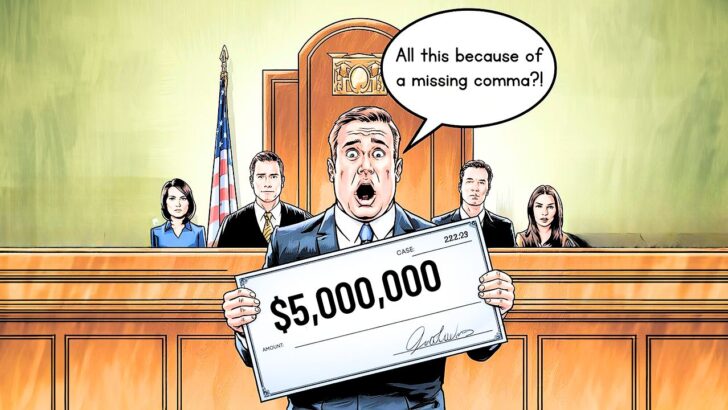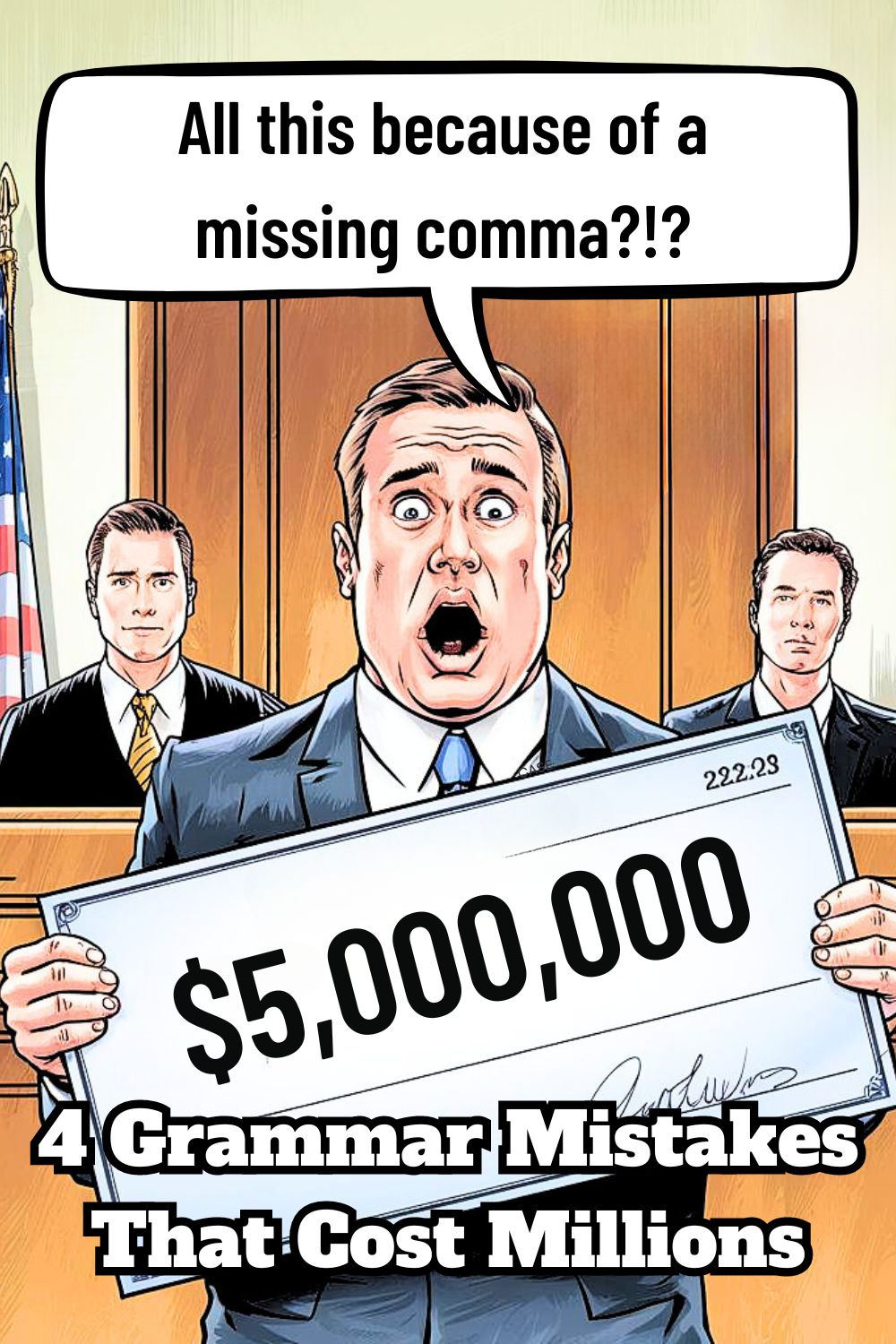Bad grammar isn’t just a pet peeve of schoolteachers and grammar enthusiasts—it can also lead to some serious, and sometimes hilarious, misunderstandings. From multimillion-dollar lawsuits to international incidents, history is filled with moments where a misplaced comma, a poorly chosen word, or a bit of sloppy syntax caused major confusion and chaos.
Imagine losing a fortune over a missing comma or triggering an international conflict because of a bad translation. It sounds absurd, but these kinds of blunders have happened more often than you’d think. In this article, we’ll walk through some of the most jaw-dropping and costly grammatical errors that have ever occurred. Some are funny, others are baffling, but all of them prove that clear communication isn’t just a good idea—it’s a necessity.
Here are 11 times bad grammar led to major misunderstandings, showing that language truly has the power to change the course of events—sometimes in the most unexpected ways.
The $5 Million Comma Catastrophe
The case revolved around the following clause in Maine’s state law regarding overtime exemptions for certain tasks:
Original Text Without the Oxford Comma:
“The canning, processing, preserving, freezing, drying, marketing, storing, packing for shipment or distribution of:
(1) Agricultural produce;
(2) Meat and fish products; and
(3) Perishable foods.”
What Went Wrong?
In this clause, the phrase “packing for shipment or distribution” is key. Without the Oxford comma (the comma that typically comes before the “or” in a list), it was unclear whether “packing for shipment” and “distribution” were meant to be two distinct activities or whether “packing for shipment or distribution” was a single activity.
The truck drivers argued that the absence of a comma meant that “distribution” was not exempt from overtime pay. They were involved in “distribution,” not “packing for shipment,” so according to their interpretation, they should be paid overtime.
The dairy company, however, intended the phrase to mean that both “packing for shipment” and “distribution” were exempt from overtime.
How Did This Lead to a $5 Million Settlement?
Because of this ambiguity, the court sided with the drivers, ruling that the lack of an Oxford comma created enough uncertainty in the contract’s language to warrant a different interpretation. As a result, the company had to pay approximately $5 million in overtime to the affected workers.
Lesson Learned:
Had the clause been written with an Oxford comma—”packing for shipment, or distribution”—the intended meaning would have been clear, and the company likely would have avoided the costly settlement. This case is a stark reminder that, in legal contexts, every word, punctuation mark, and sentence structure needs to be crystal clear to prevent misinterpretations that could have significant financial consequences.
2. The $80 Million Hyphen That Crashed a Rocket
In the world of space exploration, precision is everything. A single mistake can lead to catastrophic failure, and that’s exactly what happened in 1962 with NASA’s Mariner 1 mission. This incident is often called “the most expensive hyphen in history” because a tiny error in coding—specifically, the omission of a hyphen—led to the destruction of a spacecraft just minutes after launch.
What Happened?
The Mariner 1 spacecraft was meant to be the first American mission to reach Venus. As the spacecraft launched, everything seemed to be going smoothly until the guidance system began to malfunction. The rocket veered off course, and just 293 seconds into the flight, the range safety officer had to issue a self-destruct command to prevent it from becoming a danger to populated areas.
The Cause: A Missing Hyphen in the Code
Upon investigation, the problem was traced back to a missing hyphen in the mathematical code for the spacecraft’s guidance system. The code was supposed to include a hyphen that functioned as a symbol to differentiate between two sets of data in the navigation algorithm. Without this hyphen, the guidance system misinterpreted the data, causing the rocket to veer off its intended path.
The Cost of a Simple Typo
This missing hyphen resulted in the loss of the Mariner 1 spacecraft and cost NASA approximately $80 million (equivalent to over $700 million today when adjusted for inflation). The failure of this mission was a significant blow to the early U.S. space program, highlighting how a seemingly minor grammatical or typographical error could lead to a catastrophic outcome.
Lesson Learned:
In highly technical fields like aerospace engineering, a tiny mistake—like a missing hyphen—can have massive consequences. This incident is a stark reminder of the importance of thorough proofreading, testing, and attention to detail when working with complex systems. Even the smallest errors can lead to monumental failures, proving that grammar and punctuation aren’t just important in language—they can mean the difference between success and disaster.
3. The $40 Million Contract Dispute Over a Single Clause
When it comes to legal contracts, the way you word a sentence can make all the difference. That’s exactly what happened in a high-profile lawsuit between Rogers Communications, a major Canadian telecom company, and Bell Aliant, a utility company. This legal battle over the interpretation of a single clause cost nearly $40 million and serves as a lesson in the importance of precise language.
What Happened?
The dispute arose from a contract concerning the use of utility poles by Rogers Communications for its cable lines. The contract was supposed to be valid for five years, with an automatic renewal unless one of the parties canceled it with a year’s notice. However, confusion arose over whether the cancellation clause applied only to the renewal terms or also to the initial five-year period.
The Problem: Ambiguity in the Termination Clause
The confusion centered around the termination clause of the contract, which read:
“This agreement shall be effective from the date it is made and shall continue in force for a period of five years, and thereafter for successive five-year terms, unless and until terminated by one year’s prior notice in writing by either party.”
The key issue was how to interpret the phrase “unless and until terminated by one year’s prior notice.” The clause’s structure allowed for two different interpretations:
- Rogers Communications’ Interpretation:
- Rogers believed that the “unless and until terminated by one year’s prior notice” part applied only to the renewal periods after the initial five-year term. In their view, the first five years were guaranteed, and the contract could not be terminated early.
- Bell Aliant’s Interpretation:
- Bell Aliant argued that the “unless and until terminated by one year’s prior notice” applied to both the initial five-year term and any subsequent terms. This interpretation meant that either party could terminate the contract at any time with one year’s notice, even during the first five-year period.
The Costly Ruling
The regulatory authority sided with Bell Aliant, finding that the termination clause did indeed apply to the entire agreement, including the initial five-year term. This decision allowed Bell Aliant to break the contract early and seek higher rates, costing Rogers Communications nearly $40 million.
Why Did This Difference in Interpretation Matter?
The ambiguity came from how the clause was structured. The lack of a clear break or additional clarification in the sentence caused confusion over whether “one year’s prior notice” applied to just the renewal periods or to the entire duration starting from the beginning. The word “shall” itself wasn’t the sole issue—it was the placement of the entire termination clause and how it could grammatically modify different parts of the sentence.
Lesson Learned:
A poorly structured sentence or ambiguous clause can lead to drastically different interpretations, especially in legal documents. The case between Rogers Communications and Bell Aliant highlights the need for crystal-clear language in contracts to avoid expensive and lengthy legal battles. Contracts should be drafted with clear separation of terms and unambiguous language to prevent multiple interpretations. When millions of dollars are on the line, precision in language isn’t just a courtesy—it’s a necessity.
4. The Comma That Changed a Presidential Proclamation

Hey fellow Linguaholics! It’s me, Marcel. I am the proud owner of linguaholic.com. Languages have always been my passion and I have studied Linguistics, Computational Linguistics and Sinology at the University of Zurich. It is my utmost pleasure to share with all of you guys what I know about languages and linguistics in general.


